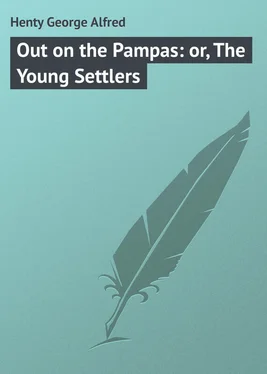George Henty - Out on the Pampas - or, The Young Settlers
Здесь есть возможность читать онлайн «George Henty - Out on the Pampas - or, The Young Settlers» — ознакомительный отрывок электронной книги совершенно бесплатно, а после прочтения отрывка купить полную версию. В некоторых случаях можно слушать аудио, скачать через торрент в формате fb2 и присутствует краткое содержание. Жанр: foreign_prose, foreign_children, на английском языке. Описание произведения, (предисловие) а так же отзывы посетителей доступны на портале библиотеки ЛибКат.
- Название:Out on the Pampas: or, The Young Settlers
- Автор:
- Жанр:
- Год:неизвестен
- ISBN:нет данных
- Рейтинг книги:5 / 5. Голосов: 1
-
Избранное:Добавить в избранное
- Отзывы:
-
Ваша оценка:
- 100
- 1
- 2
- 3
- 4
- 5
Out on the Pampas: or, The Young Settlers: краткое содержание, описание и аннотация
Предлагаем к чтению аннотацию, описание, краткое содержание или предисловие (зависит от того, что написал сам автор книги «Out on the Pampas: or, The Young Settlers»). Если вы не нашли необходимую информацию о книге — напишите в комментариях, мы постараемся отыскать её.
Out on the Pampas: or, The Young Settlers — читать онлайн ознакомительный отрывок
Ниже представлен текст книги, разбитый по страницам. Система сохранения места последней прочитанной страницы, позволяет с удобством читать онлайн бесплатно книгу «Out on the Pampas: or, The Young Settlers», без необходимости каждый раз заново искать на чём Вы остановились. Поставьте закладку, и сможете в любой момент перейти на страницу, на которой закончили чтение.
Интервал:
Закладка:
Here the feeling of sea-sickness, which the excitement of the scene had kept off, increased rapidly; and they were glad to slip off their upper clothes, and to throw themselves upon their berths before the paroxysm of sickness came on.
When questioned afterwards as to the events of the next thirty-six hours, the young Hardys were all obliged to confess that that time was a sort of blank in their memory, – a sort of horrible nightmare, when one moment they seemed to be on their heads, and the next upon their feet, but never lying down in a comfortable position, when sometimes the top of the cabin seemed under their feet, sometimes the floor over their head. Then, for a change, everything would go round and round; the noise, too, the groaning and the thumping and the cracking, the thud of the waves and the thump of the paddles, and the general quivering, and shaking, and creaking, and bewilderment; – altogether it was a most unpleasant nightmare. They had all dim visions of Mr. Hardy coming in several times to see after them, and to give them a cup of tea, and to say something cheering to them; and all four had a distinct idea that they had many times wished themselves dead.
Upon the second morning after the storm began, it showed some signs of abating, and Mr. Hardy said to his sons, ‘Now, boys, make an effort and come upon deck; it’s no use lying there; the fresh air will do you good.’ Two dismal groans were the only response to this appeal.
‘Yes, I know that you both feel very bad, and that it is difficult to turn out; still it is worth making the effort, and you will be very glad of it afterwards. Come, jump up, else I shall empty the water-jug over you. There, you need not take much trouble with your dressing,’ he went on, as the boys, seeing that he was in earnest, turned out of their berths with a grievous moan. ‘Just hold on by something, and get your heads over the basin; I will empty the jugs on them. There, now you will feel better; slip on your clothes and come up.’
It was hard work for Charley and Hubert to obey orders, for the ship rolled so tremendously that they could only proceed with their dressing by fits and starts, and were more than once interrupted by attacks of their weary sea-sickness. However, their father stayed with them, helping and joking with them until they were ready to go up. Then, taking them by the arm, he assisted them up the stairs to the deck.
Miserable as the boys felt, they could not suppress an exclamation of admiration at the magnificent scene before them. The sea was tossed up in great masses of water, which, as they neared the ship, threatened to overwhelm them, but which, as she rose on their summits, passed harmlessly under her, hurling, however, tons of water upon her deck. The wind was still blowing fiercely, but a rift in the clouds above, through which the sun threw down a bright ray of light upon the tossing water, showed that the gale was breaking.
The excitement of the scene, the difficulty of keeping their feet, and the influence of the rushing wind, soon had the effect which their father predicted. The boys’ looks brightened, their courage returned; and although they still had an occasional relapse of sickness, they felt quite different beings, and would not have returned to the blank misery of their cabins upon any consideration. They were soon able to eat a piece of dry toast, which Mr. Hardy brought them up with a cup of tea at breakfast-time, and to enjoy a basin of soup at twelve o’clock, after which they pronounced themselves as cured.
By the afternoon the force of the wind had greatly abated, and although a heavy sea still ran, the motion of the vessel was perceptibly easier. The sun, too, shone out brightly and cheeringly, and Mr. Hardy was able to bring the little girls, who had not suffered so severely as their brothers, upon deck. Two more days of fine weather quite recruited all the party; and great was their enjoyment as the Barbadoes entered the Tagus, and, steaming between its picturesque banks and past Cintra, dropped her anchor off Lisbon.
As our object, however, is to relate the adventures of our young settlers upon the Pampas of La Plate, we must not delay to describe the pleasure they enjoyed in this their first experience in foreign lands, nor to give an account of their subsequent voyage across the Atlantic, or their admiration at the superb harbour of Rio. A few days’ further steaming and they arrived at the harbour of Buenos Ayres, where the two great rivers, the Uruguay and the Parana, unite to form the wide sheet of water called the River La Plate. It was night when the Barbadoes dropped her anchor, and it was not until the morning that they obtained their first view of their future home.
Very early were they astir, and as soon as it was broad daylight, all four of the young ones were up on deck. Their first exclamation was one of disappointment. The shores were perfectly flat, and, seen from the distance at which they were anchored, little except the spires of the churches and the roofs of a few of the more lofty houses could be seen. After the magnificent harbour of Rio, this flat, uninteresting coast was most disappointing.
‘What a distance we are anchored from the shore!’ Hubert said, when they had recovered a little from their first feeling. ‘It must be three or four miles off.’
‘Not so much as that, Hubert,’ Maud, who was just a little fond of contradicting, said; ‘not more than two miles, I should think.’
Hubert stuck to his opinion; and as the captain came on deck they referred the matter to him.
‘The distance of objects across water is very deceiving,’ he said. ‘It is from eight to nine miles to those buildings you see.’
Maud looked rather crestfallen, and Charley asked, ‘Why do we anchor such a long way off, captain?’
‘Because the shore is so flat that there is no water for us to get in any closer. In a couple of hours you will see boats coming out to fetch you in; and unless it happens to be high tide, even these cannot get to the beach, and you will have to land in carts.’
‘In carts, Captain Trevor?’ they all repeated; ‘that will be a strange way of landing.’
‘Yes, it is,’ the captain answered. ‘I think that we can safely say that the Argentine Republic is the only country in the world where the only way to land at its chief city is in a cart.’
The captain’s boat was by this time lowered, and he at once started for shore with his papers. Soon after ten o’clock he returned, followed by a number of boats. He brought also a letter to Mr. Hardy from an old friend who had been settled for some years near Buenos Ayres, and whose advice had decided him to fix upon that country as the scene of his labours. It contained a warm welcome, and a hearty congratulation upon their safe arrival. This letter had been written two or three days previously, and had been left at the office of the steamship company. It said, however, that the writer would hear of the arrival of the steamer, and would have everything in readiness to take them out to his place upon their landing.
Mr. Hardy had been in frequent communication with his friend from the time that he had determined to emigrate, and Mr. Thompson’s letters had contained the warmest assurance of a welcome, and an invitation to make his house their home until they had one of their own to go into; and now this kind letter, coming off so instantly after their arrival, cheered them all much, and made them feel less strange and to some extent at home in the new country at once.
CHAPTER III.
A NEW LIFE
TIDE was fortunately high, and the boat containing the Hardys and the lighter portion of their luggage was able to get up to the landing place without the carts being called into use. As they approached the land they were hailed in a hearty voice, and greetings were exchanged between Mr. Hardy and his friend Mr. Thompson – a sunburnt-looking man with a great beard – in a Panama hat and in a suit of spotless white.
Читать дальшеИнтервал:
Закладка:
Похожие книги на «Out on the Pampas: or, The Young Settlers»
Представляем Вашему вниманию похожие книги на «Out on the Pampas: or, The Young Settlers» списком для выбора. Мы отобрали схожую по названию и смыслу литературу в надежде предоставить читателям больше вариантов отыскать новые, интересные, ещё непрочитанные произведения.
Обсуждение, отзывы о книге «Out on the Pampas: or, The Young Settlers» и просто собственные мнения читателей. Оставьте ваши комментарии, напишите, что Вы думаете о произведении, его смысле или главных героях. Укажите что конкретно понравилось, а что нет, и почему Вы так считаете.












